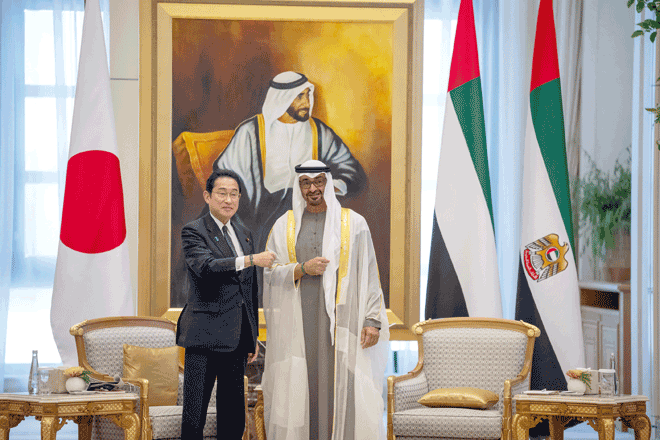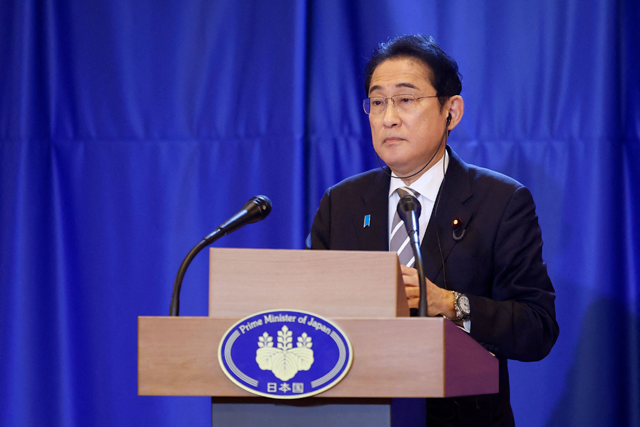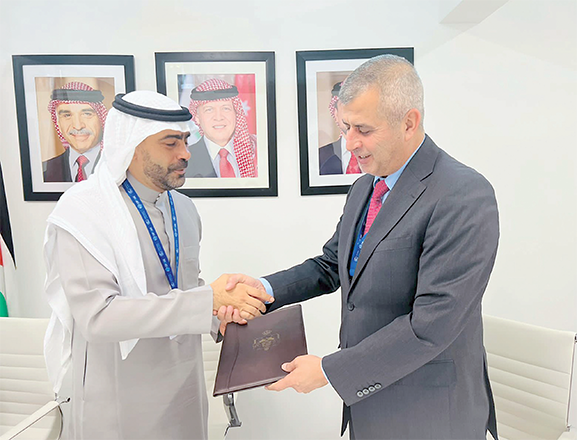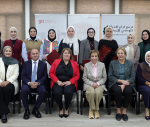You are here
Clean energy on agenda of Japan PM talks in UAE ahead of COP28
By AFP - Jul 17,2023 - Last updated at Jul 17,2023

UAE President Sheikh Mohamed Bin Zayed Al Nahyan and Japan's Prime Minister Fumio Kishida posing for a photo with COP28 UN Climate Change Conference wrist bands during an official reception at Qasr Al Watan in Abu Dhabi on Monday (AFP photo / UAE'S Ministry of Presidential Affairs)
DUBAI — Japanese Prime Minister Fumio Kishida on Monday discussed clean energy cooperation with top officials during a visit to the UAE, host of this year's UN climate talks.
Kishida's visit to the United Arab Emirates, which will host COP28 in November-December, is part of the first Gulf tour by a Japanese premier since the late Shinzo Abe in 2020.
Japan relies almost entirely on imports for its crude oil, with Saudi Arabia, the UAE and Qatar accounting for the bulk of its supplies.
But as the oil-producing Gulf states move towards cleaner energy sources, especially ahead of COP28, Japan is hoping to offer its greener and renewable energy technologies to assist their decarbonisation efforts.
Kishida flew in from Saudi Arabia, where he met de facto leader Crown Prince Mohammed bin Salman on Sunday. After talks with UAE President Sheikh Mohammed Bin Zayed Al Nahyan in Abu Dhabi, he will head to Qatar on Tuesday.
On Monday, Sheikh Mohammed said he held "fruitful and constructive discussions" with Kishida in Abu Dhabi on "developing bilateral relations and advancing the comprehensive strategic partnership between our two countries".
The leaders "affirmed the commitment of both countries to enhancing cooperation on climate action, decarbonisation efforts, and clean energy in the lead-up to COP28", according to a joint statement carried by the COP28 team.
The Japanese premier later met with COP28 president Sultan Al Jaber, who is also the head of the UAE oil giant ADNOC.
They discussed “unlocking further global cooperation to utilise more cutting-edge technologies to scale up climate action and accelerate the transition towards a net zero economy”, said a COP28 statement.
‘Decarbonisation technologies’
During his UAE visit, the Japanese premier plans to offer Japan’s “cutting-edge decarbonisation technologies” as part of a green energy initiative for the Middle East, he said in an open letter carried by the UAE’s official WAM news agency.
Under the initiative, the UAE and Japan “will be well placed to collaborate in the related fields of hydrogen and ammonia production and utilisation as well as carbon recycling”, Kishida added.
Shigeto Kondo, a senior researcher with The Institute of Energy Economics in Japan, said that Tokyo and Gulf states were “initiating their own strategy for carbon neutrality”.
“Japan and the Gulf states think that climate actions should be realistic, and blue hydrogen and ammonia are one of the realistic solutions to climate change for the time being,” he told AFP.
On Sunday, Kishida discussed energy security and decarbonisation with senior Saudi officials including Prince Mohammed in the Red Sea city of Jeddah.
During the meeting with Prince Mohammed, Tokyo and Saudi Arabia agreed to launch the “Lighthouse Initiative for Clean Energy Cooperation”, according to the official Saudi Press Agency.
“The initiative will support the ongoing efforts that Saudi Arabia is undertaking to become a hub for clean energy,” said a joint statement carried by SPA on Monday.
It will focus on areas including hydrogen, ammonia, recycled carbon fuels and carbon capture technology, the statement said.
GCC trade deal
Saudi Arabia is the biggest oil exporter to Japan, fulfilling 40 per cent of its total needs, the kingdom’s Energy Minister Prince Abdulaziz Bin Salman said on Sunday.
During Kishida’s visit, Saudi Arabia and Tokyo signed 26 cooperation agreements, including in the fields of energy and green energy, according to the state-run Al Ekhbariya TV.
The six-member Gulf Cooperation Council and Japan on Sunday also announced the resumption of Free Trade Agreement (FTA) negotiations, according to a GCC statement.
The GCC-Japan FTA negotiations began in Tokyo in September 2006 but talks were suspended in 2009.
Japan’s prime minister was due to visit Saudi Arabia, the UAE and Qatar in August last year, but he postponed the trip after contracting the coronavirus.
His visit comes at a time of deepening engagement between the region and China, which brokered a shock detente between Gulf rivals Saudi Arabia and Iran in March.
Related Articles
DOHA — Japan's Prime Minister Fumio Kishida visited gas-rich Qatar on Tuesday to wrap up a Gulf tour centred on energy security and cooperat
AMMAN — Memoranda of Understanding (MoUs) signed during COP28 in the field of green hydrogen and green ammonia are set to usher a new era of
WASHINGTON — The United States announced a clean energy partnership on Tuesday with the United Arab Emirates worth $100 billion, the White H


















